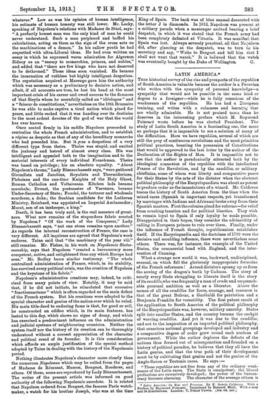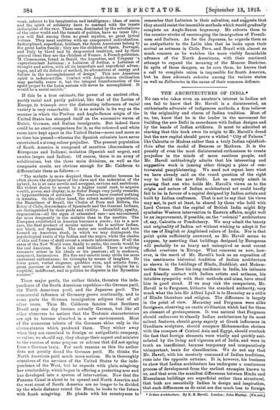LATIN AMERICA.* THIS historical survey of the rise and prospects
of the republics of South America is valuable because the author is a Peruvian who writes with the sympathy of personal knowledge—a sympathy that would not be possible in the same kind or degree to a foreigner—while he is fully conscious of the weaknesses of the republics. He has had a Zuropean training, and writes with a calmness and learnOg that are wholly admirable. He is not praised mole than he deserves in the interesting preface which M. Raymond Poincare wrote before he was elected President. The study of Latin South America is a fascinating one, the more so perhaps that it is impossible to see a solution of many of the difficulties. Here we have republics, several of which are still the prey of continuous revolutions and the most primitive political practices, boasting the possession of Constitutions that would be approved to the last letter by the author of the Declaration of the Rights of Man. It is impossible not to see that the author is paradoxically attracted both by the ideological connexion of the republics with the intellectual France of the Revolution, and by the caudillos, or military chieftains, some of whom won liberty and comparative peace for their States by the arts of the dictator wheu the abstract political philosophy of the Encyclopaedists was about as potent to produce order as the incantations of a wizard. Mr. Calderon traces the history of South America from the time when the mixed races (Spanish in important respects, yet transformed by marriages with Indians and Africans) broke away from their Spanish masters. First the colonies plead for reforms—for relief from crushing taxation and for political liberties. They wish to remain loyal to Spain if only loyalty be made possible. Disappointed in their hopes, they consider the advisability of calling in European princes to rule over them. Finally, under the influence of French thought, republicanism establishes itself. If the Encyclopaedia and the doctrines of 1789 were the decisive and moulding influence, there were nevertheless some others. There was, for instance, the example of the United States, the commercial bond with England, and the inter- vention of Canning.
What a strange new world it was, backward, undisciplined, sensual, on which fell the gloriously inappropriate formulae of the French reformers ! Armed dictators sprang up as from the sowing of the dragon's teeth by Cadmus. The story of nearly every State struggling to liberate itself is the story of its can dillo,who was frequently a man of crude and unquench- able personal ambition as well as a liberator. Above the names of all the caudillos for force, courage, and resource is that of the great Bolivar, a Garibaldi for patriotism and a Benjamin Franklin for versatility. The first patent result of the application to South America of the political philosophy of the Encyclopaedists was, however, military anarchy. States split into smaller States, and the country became the cockpit of warring caudillos. And yet it was due to the caudillos, and not to the inspiration of an imported political philosophy, that conscious national groupings developed and industry and a comparative degree of order grew round each nucleus of government. While the author deplores the defects of the nations thus formed out of miscegenation and founded on a history of political paradox, he believes that they all have the Latin genius, and that the true path of their development must be by cultivating that genius and not the genius of the Anglo-Saxon or Teutonic races. He says
These republics are not free from any of the ordinary weak- nesses of the Latin races. The State is omnipotent; the liberal professions are excessively developed ; the power of the bureau- cracy becomes alarming. The character of the average citizen is
Latin America: its Rise and Progress. By F. Garcia Calderon. With a Preface by Raymond Poincare. Translated by Bernard ?Mall. With a map and 34 illustrations. London: T. Fisher Unwin. [108. 64. net.]
weak, inferior to his imagination and intelligence ; ideas of union and the spirit of solitarily have to contend with the innate indiscipline of the race. These men, dominated by the solicitations of the outer world and the tumult of politics, have no inner life ; you will find among them no great mystics, no great lyrical writers. They meet realities with an exasperated individualism. Indisciplined, superficial, brilliant, the South Americans belong to the great Latin family ; they are the children of Spain, Portugal, and Italy by blood and by deep-rooted tradition, and by their general ideas they are the children of France. A French politician, M. Clemenceau, found in Brazil, the Argentine, and Uruguay superabundant Latinism ; a Latinism of feeling, a Latinism of thought and action, with all its immediate and superficial advan- tages, and all its defects of method, its alternatives of energy and failure in the accomplishment of design.' This new American spirit is indestructible. Contact with Anglo-Saxon civilization may partially renew it, but the integral transformation of the spirit proper to the Latin nations will never be accomplished. It would be a racial suicide."
If this be a true estimate, the power of an ancient ethos,
partly racial and partly political, like that of the Latins of Europe, to triumph over the distracting influences of racial variety is very remarkable. It is as notable in its way as the manner in which the Puritan and Anglo-Saxon origin of the United States has stamped itself on the successive waves of Dutch, German, and Italian immigrants. But indeed there could be no exact comparison for it, as the coloured and white races have kept apart in the United States—more and more so as time has passed—whereas the Spanish colonists have never
entertained a strong colour prejudice. The present population of South America is composed of mestizos (descendants of Europeans and Indians), mulattos (Spanish and negro), and zambos (negro and Indian). Of course, there is an army of subdivisions, but the three main divisions, as well as the composite creole, are obvious enough for Mr. Calderon to differentiate them as follows :—
"The mulatto is more despised than the mestizo because he often shows the abjectness of the slave and the indecision of the hybrid; he is at once servile and arrogant, envious and ambitious. His violent desire to mount to a higher social rank, to acquire wealth, power, and display, is, as Sefior Bunge very justly remarks, a hyperaesthesia of arrivism: The zambos have created nothing in America. On the other hand, the robust mestizo populations, the Mamelucos of Brazil, the Cholos of Peru and Bolivia, the Rotos of Chile, descendants of Spaniards and the Guarani Indians, are distinguished by their pride and virility. Instability, apathy, degeneration—all the signs of exhausted race—are encountered far more frequently in the mulatto than in the mestizo. The European established in America becomes a creole ; his is a new race, the final product of secular unions. He is neither Indian, nor black, nor Spaniard. The castes are confounded and have formed an American stock, in which we may distinguish the psychological traits of tho Indian and the negro, while the shades of skin and forms of skull reveal a remote intermixture. If all the races of the New World were finally to unite, the creole would be the real American. He is idle and brilliant. There is nothing excessive either in his ideals or his passions ; all is mediocre, measured, harmonious. His fine and caustic irony chills his more exuberant enthusiasms; he triumphs by means of laughter. He loves grace, verbal elegance, quibbles even, and artistic form; great passions or desires do not move him. In religion be is sceptical, indifferent, and in politics he disputes in the Byzantine manner."
Three major perils, the author thinks, threaten the inde- pendence of the South American republics—the German peril, the North American peril, and the Japanese peril. The commercial influence of Germany grows continually, and in some parts the German immigration eclipses that of all other races. Thus Mr. Calderon fancies that Southern Brazil may one day become actually German, but like all other observers he notices that the Teutonic characteristics are apt to become absorbed in a new environment,. Most of the numerous talents of the Germans shine only in the circumstances which produced them. They wither away when they are exercised in foreign or antipathetic company, or rather, we should say, they change their aspect and minister to the success of some purpose or scheme that did not spring from a German brain. For such reasons as this the author does not greatly dread the German peril. He thinks the North American peril much more serious. He is thoroughly conscious of the services of the United States to the inde- pendence of the West, but he regards with plain misgiving her overlordship, which began in offering a protecting arm and has developed into a system of intervention. Now that the Panama Canal is about to be opened and North America and the west coast of South America are no longer to be divided by the whole distance round the Horn, he looks to the future with frank misgiving. He pleads with his countrymen to
remember that Latinism is their salvation, and sugg* eats that they should resist the insensible methods which would gradually complete an Anglo-Saxon hegemony. He exhorts them to the counter-stroke of encouraging the immigration of French- men and Italians. As for the Japanese, he regards them as so antipathetic to the Latin idea that lie looks upon their arrival as artisans in Chile, Peru, and Brazil with almost as much concern as be watches the more visibly formidable advance of the North Americans, with their continual attempt to expand the meaning of the Monroe Doctrine. In spite of these dangers, as he sees them, be knows that a call to complete union is impossible for South America, but he does advocate ententes among the various states as well as Zollvereins in the cause of their common defence.











































 Previous page
Previous page